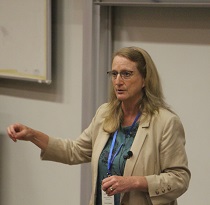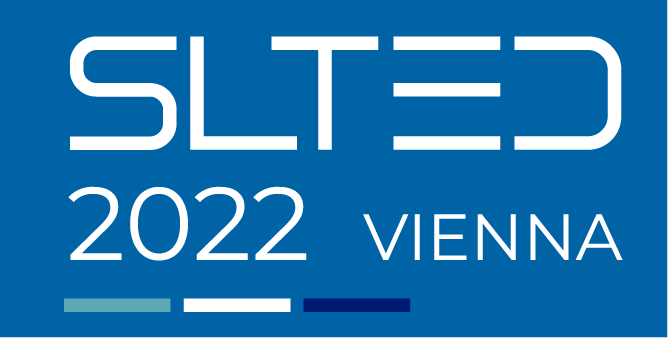Karen E. Johnson

Karen E. Johnson
The Pennsylvania State University, USA
Praxis-Oriented Pedagogy and the Development of L2 Novice Teacher Expertise
About the Speaker
Karen E. Johnson is Kirby Professor of Language Learning and Applied Linguistics at The Pennsylvania State University, USA. Her research focuses on a sociocultural theoretical perspective on second language teacher education, the dynamics of communication in second language classrooms, and narrative inquiry as professional development. Her research has appeared most recently in The Modern Language Journal, TESOL Quarterly, Language Teaching Research, Teaching and Teacher Education, Teacher Development, and Language and Sociocultural Theory. She is the author of Understanding Communication in Second Language Classrooms (Cambridge, 1995), Understanding Language Teaching: Reasoning in Action (Heinle & Heinle, 1999) and co-editor of Teachers' Narrative Inquiry as Professional Development (Cambridge, 2002). More recently she is the author of Second Language Teacher Education (Routledge, 2009), co-editor of Research on Second Language Teacher Education (Routledge, 2011), and co-author of Mindful L2 Teacher Education (Routledge, 2016). In the MA TESL and the Ph.D. in Applied Linguistics degree programs, she teaches courses in Applied Linguistics, Teaching English as a Second Language, Teaching L2 Writing, Communication in Second Language Classrooms, Theory and Research in Language Teacher Education, and Sociocultural Theory and L2 Learning.
Abstract
While decades of L2 teacher cognition research have critically examined what L2 teachers know, believe, and think (Borg, 2006), limited progress has been made in addressing fundamental questions about the developmental trajectory of L2 teacher/teaching expertise. In their introductory article for The Modern Language Journal special issue on L2 teacher cognition, Kubanyiova and Feryok (2015) maintain that “what constitutes the meaningful and worthwhile impact of teacher education is far from resolved” (p. 436). This plenary traces a cohort of three novice ESL teachers over a two-year period as they move through a series of three praxis-oriented courses in an MA TESL program. Praxis-oriented pedagogy, the practices teacher educators create and enact in these courses and with the novice teachers, is systematically and intentionally informed by Vygotskian sociocultural theory, and sociocultural theory informs how the novice teachers’ engagement in these practices is understood. Thus, praxis-oriented pedagogy represents an educational intervention that reflects the dialectical principle that changes in social activities affect cognitive development, or more concretely, how appropriately designed language teacher education practices can change the way language teachers think about and enact language teaching. As Lantolf and Poehner (2014) state succinctly of Vygotsky’s commitment to ‘praxis’: “a theory is no longer an instrument for observing the object of study, it is, instead, the instrument for changing the object of study” (p. 37).
I will present a micro-genetic analysis of the three novice teachers’ engagement in their initial learning-to-teach experience, in their tutoring internship, and in their 15-week practicum. During their first semester, video, audio, and reflective data from an extended team-teaching project capture how the three novice teachers, as a team, planned for, practiced, re-planned, taught, and reflected on teaching an actual 75-minute ESL lesson. The quality and character of the mediation provided by the teacher educator and how that mediation is taken up by the novice teachers is examined. During the second semester, the novice teachers engaged in intensive weekly reflective writing produced in a mentored tutoring internship, capturing both evidence of changes in their understanding (cognition and orientation) and in responsive engagement (practice and affect) in their tutoring activities. During the final semester of the program, the novice teachers participated in a 15-week mentored practicum and wrote weekly reflective journals in which they were asked to recall, reflect, and re-imagine their instructional experiences. Additionally, their teaching activity was video recorded on three occasions and reflected on with the practicum supervisor.
The findings of this longitudinal study illustrate how praxis-oriented teacher education pedagogy contributed to crucial intersections of theory and practice, where professional, intentional, and reasoned activity is modeled, enacted, and explored. The findings also document evidence of shifts in the novice teachers’ instructional stance (i.e., from teacher-centered to student-oriented) and re-imagined identities (i.e., learner vs. teacher) as developing language teachers. The findings empirically document how engagement in these practices facilitated the novice teachers’ emerging abilities to create and enact meaningful learning environments for their L2 students. Overall, this plenary offers language teacher educators rich descriptions of the developmental trajectory of novice L2 teacher/teaching expertise and how it can be informed by engagement in praxis-oriented L2 teacher education.
